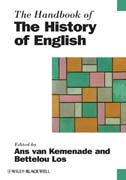
The Handbook of the History of English is a collection of articles written byleading specialists in the field that focus on the theoretical issues behind the facts of the changing English language. The innovative organization of this volume applies recent insights to old problems and surveys the history of English from the perspective of structural developments in areas such as phonology, prosody, morphology, syntax, semantics, language variation, and dialectology. This unique handbook offers readers a comprehensive overview of the various theoretical perspectives available to the field and sets new objectives for further research. INDICE: Editors' Introduction.Notes on Contributors.Part I: Approaches andissues.1. Change for the Better? Optimality Theory versus History: April McMahon (University of Sheffield).2. Cueing a New Grammar: David Lightfoot (Georgetown University).3. Variation and the Interpretation of Change in periphrasticDO: Anthony Warner (University of York).4. Evolutionary Models and Functional-Typological Theories of Language Change: William Croft (University of New Mexico).Part II: Words: derivation and prosody.5. Old and Middle English Prosody:Donka Minkova (UCLA).6. Prosodic Preferences: From Old English to Early Modern English: Paula Fikkert (Radboud University Nijmegen, The Netherlands), Elan Dresher (University of Toronto, Canada) and Aditi Lahiri (University of Konstanz, Germany).7. Typological Changes in Derivational Morphology: Dieter Kastovsky (University of Vienna).8. Competition in English Word Formation: Laurie Bauer (Victoria University of Wellington).Part III: Inflectional morphology and syntax.9. Case Syncretism and Word Order Change: Cynthia Allen (Australian National University).10. Discourse Adverbs and Clausal Syntax in Old and Middle English: Ans van Kemenade (Radboud University Nijmegen) and Bettelou Los (Vrije Universiteit Amsterdam).11. The loss of OV Order in the History of English: Susan Pintzuk and Ann Taylor (both University of York).12. Category Change and Gradience in the Determiner System: David Denison (University of Manchester).Part IV: Pragmatics.13. Pathways in the development of pragmatic markers in English: Laurel Brinton (University of British Columbia).14. The Semantic Development of Scalar Focus Modifiers: Elizabeth Traugott (Stanford University).15. Information Structure and Word Order Change: The Passive as an Information Rearranging Strategy in the History of English: Elena Seoane (University of Santiago de Compostela).Part V: Pre- and postcolonial varieties.16. Old English Dialectology: Richard Hogg (University of Manchester).17. Early Middle English Dialectology: Problems and Prospects: Margaret Laing (University of Edinburgh) andRoger Lass (University of Cape Town).18. How English became African American English: Shana Poplack (University of Ottawa).19. Historical Change in Synchronic Perspective: The Legacy of British Dialects: Sali Tagliamonte (University of Toronto).20. The making of Hiberno-English and other 'Celtic Englishes': Markku Filppula (University of Joensuu).Part VI: Standardisation and globalization.21. Eighteenth-century Prescriptivism and the Norm of Correctness: Ingrid Tieken - Boon van Ostade (University of Leiden).22. Historical Sociolinguisticsand Language Change: Terttu Nevalainen (University of Helsinki).23. Global English: From Island Tongue to World Language: Suzanne Romaine (University of Oxford).Appendix: Useful Corpora for Research in English Historical Linguistics.Index.
- ISBN: 978-1-4051-8786-2
- Editorial: Wiley-Blackwell
- Encuadernacion: Rústica
- Páginas: 672
- Fecha Publicación: 23/01/2009
- Nº Volúmenes: 1
- Idioma: Inglés
